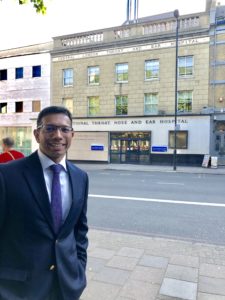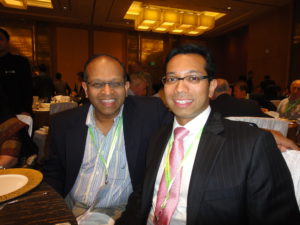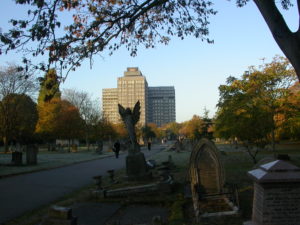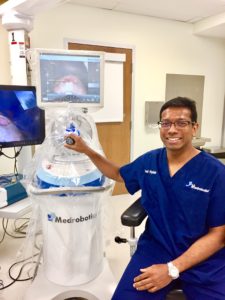Why become an ENT Specialist?
As an Assistant Professor and House Tutor at the Lee Kong Chian School of Medicine, I am frequently asked by medical students why I chose to become an ENT Specialist. Ear, Nose and Throat Surgery is a rather small surgical sub-speciality and it often does not get much attention at medical school. When I was at medical school, we only spent two weeks in the ENT Department and had precious little exposure to the specialty. In some medical schools these days, students may not even get a week of an ENT posting.

Standing across Gray’s Inn Road from the Royal National Throat Nose and Ear Hospital where I spent three years in ENT specialist training
Truth to be told, very few doctors make career choices for sound sensible reasons! Its a mixture of serendipity and personal experiences. I chose ENT as a career principally because I met a few ENT Specialists who seemed happy and contented, and enjoyed what they did! The first ENT Specialist who made a huge impression on me was Professor Suren Krishnan of Adelaide. In 1995, he was a fellow at the Radcliffe Infirmary in Oxford, UK, and I was fortunate enough to have been there as a medical student in the same firm. Medical specialists are grouped into teams and these teams are called ‘firms’. Suren – whom I later came to know as a mentor and friend – was an ebullient character. I still vividly recall watching him perform partial laryngeal surgery on a patient in Oxford with great finesse. His clinic sessions were great learning opportunities for medical students. He saw patients, assessed them carefully, had clarity in his diagnosis and management, and still managed to impart useful knowledge to the medical students sitting intently in the corner of his room.

Needless to say, there were many other ENT Specialists that made impressions on me and drove my desire to pursue this specialty. In fact, having made it into ENT specialist training in the United Kingdom, my choice of sub-specialty training was also driven largely by the people I met. Two ENT Specialists that made a huge impression on me were the two head and neck surgeons at Charing Cross Hospital in West London at the turn of the century. They were Mr Tony Cheesman and Mr Peter Clarke. Both exceptional surgeons but extremely humble, and the nature of their work and the manner in which they cared and treated patients made me want to do Head and Neck Cancer Surgery as a subspecialty interest.

Of course, good doctors will always inspire their younger colleagues to try and follow in their footsteps but there must be something inherent in a specialty to sustain the interests of a young surgeon to continue to pursue a specialty. So here are some of the reasons that continue to sustain my interests and keep me going as an ENT specialist.
The anatomy and the ear nose and throat is some of the most intricate anatomy anywhere in the human body. We often say that 5 of the 7 human orifices lie in the realms of ENT Surgery. The bones, muscles, joints, arteries, veins and nerves of the head and neck are very complex. I teach head and neck anatomy at the Lee Kong Chian School of Medicine and each time I revise the anatomy before the practical sessions, I learn something new! I also see how anatomy relates to the clinical practice of Ear Nose and Throat Surgery. How infections in one part produce abscesses in an adjacent neck space, how tumours spread locally from one site to another, and take out cranial nerves that traverse the different compartments within the head and neck.
ENT conditions also present in interesting and challenging ways. For example, pain in the ear – something we call otalgia – can be due to a problem in the throat. Dizziness can be due to a whole variety of problems – and trying to work out the cause really employs all the skills of a good doctor. You need to take a good history, ask the right questions, examine the patient thoroughly and piece together what may be a very complex puzzle!
Examining the ear nose and throat is also now very interesting. In the past, the ENT surgeon would rely on an otoscope to look into the ear, a bull’s eye mirror and lamp to examine the mouth, and a laryngeal mirror to inspect the voicebox. We now have high-definition fibreoptic scopes that allow us to see things with greater clarity and make more accurate diagnoses.
The ENT specialist is both a surgeon and a physician. There are many ENT conditions that do not require surgery. Indeed the best ENT specialists are physicians first, and surgeons second! The ENT specialist who does not keep abreast of the rapidly evolving field of medicine is doomed to provide sub-optimal care to his patients. The best ENT specialists should exhaust non-surgical options to treat a condition before embarking on surgery. It is simply good medical practice!
ENT surgery is interesting and varied. Microscopic surgery of the ear or voicebox is delicate and precise. The surgeon needs to be dextrous – the movements of the fingers need to be smooth and precise! Head and neck surgery deals with much larger structures and at times one has to employ more ‘gross’ movements. I am always reminded of how a thyroid surgeon may use his fingers to sweep behind an enlarged nodular thyroid lobe and deliver it out of the neck through a small neat neck incision!
ENT surgery has benefitted from the advancement of technology. We now use instruments that allow us to do things that our predecessors were incapable of performing. These include the use of endoscopes, lasers and robots. Surgery has also become safer with the use of navigational instruments and tools that minimise blood loss. I routinely use navigational systems when I perform sinus surgery and nerve monitors when I undertake thyroid and parotid surgery. I think the advances in safety has been the most striking improvement in ENT surgery. It is important that this does not lead to a sense of hubris amongst ENT specialists. Just because we can do operation it doesn’t always mean we should do it.
Finally, the thing that is most appealing about being an ENT Specialist is that the majority of us are able to see young children, adolesecents, adults and the elderly. That variety is nice, and you have to be able to communicate with people of all ages. Engaging a child, gaining their confidence is a difficult skill. Being patient with the elderly who may be frail and deaf is also a skill.
I am glad that circumstances and experiences have led me to this wonderful specialty. If you are a medical student or a junior doctor and would like to know more about ENT surgery or how to be an ENT specialist, please do email me at drjeeve@entclinic.sg. I do hope you enjoyed reading this piece.

Share this blog via:









